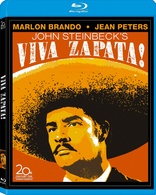Viva Zapata! Blu-ray Movie
HomeViva Zapata! Blu-ray Movie 
60th Anniversary Edition / Fox Studio Classics20th Century Fox | 1952 | 113 min | Not rated | May 07, 2013
Movie rating
7.1 | / 10 |
Blu-ray rating
| Users | 0.0 | |
| Reviewer | 3.5 | |
| Overall | 3.5 |
Overview
Viva Zapata! (1952)
The story of Mexican revolutionary Emiliano Zapata, who led a rebellion against the corrupt, oppressive dictatorship of president Porfirio Diaz in the early 20th century.
Starring: Marlon Brando, Jean Peters, Anthony Quinn, Joseph Wiseman, Arnold MossDirector: Elia Kazan
| Western | Uncertain |
| Biography | Uncertain |
| War | Uncertain |
| Drama | Uncertain |
| History | Uncertain |
Specifications
Video
Video codec: MPEG-4 AVC
Video resolution: 1080p
Aspect ratio: 1.37:1
Original aspect ratio: 1.37:1
Audio
English: DTS-HD Master Audio 2.0 Mono (48kHz, 24-bit)
Spanish: Dolby Digital 2.0 Mono (224 kbps)
French: Dolby Digital 2.0 Mono (224 kbps)
Subtitles
English SDH, Spanish
Discs
25GB Blu-ray Disc
Single disc (1 BD)
Playback
Region free
Review
Rating summary
| Movie | 3.5 | |
| Video | 4.5 | |
| Audio | 4.0 | |
| Extras | 0.5 | |
| Overall | 3.5 |
Viva Zapata! Blu-ray Movie Review
Brando as the Reluctant Revolutionary
Reviewed by Casey Broadwater May 16, 2013Stop me if you've heard this one—two former communists and a white Method actor in brown-face make a movie...
Okay, so there's no punchline to that would-be joke, but the film in question, of course, is 1952's Viva Zapata!, written by John Steinbeck,
directed by Elia Kazan—the two one-time communists—and starring a hispani-fied Marlon Brando, whose career was in quick ascendance after his
powerful turn in Kazan's previous effort, the Tennessee Williams adaptation A Streetcar Named Desire. Brando would re-team with Kazan
again in 1954 for the union drama On the Waterfront, and so Viva Zapata! is often overshadowed, sandwiched between two films of
such iconic stature. Of their three collaborations, Zapata! is undoubtedly the weakest—it has nothing quite as potent as Streetcar's
raw sensuality or Waterfront's underdog consciousness—but it is an object of interest as one of Kazan's most atypical films, moving away from
social realism and toward a kind of political mythologizing, making the biography of famed Mexican revolutionary Emiliano Zapata more romantic (and
tidy) than it actually was. "Whitewashed" is a good term here; not only does the film treat Zapata and the Mexican Revolution rather euphemistically,
it also features precious few Hispanic actors in the key roles.
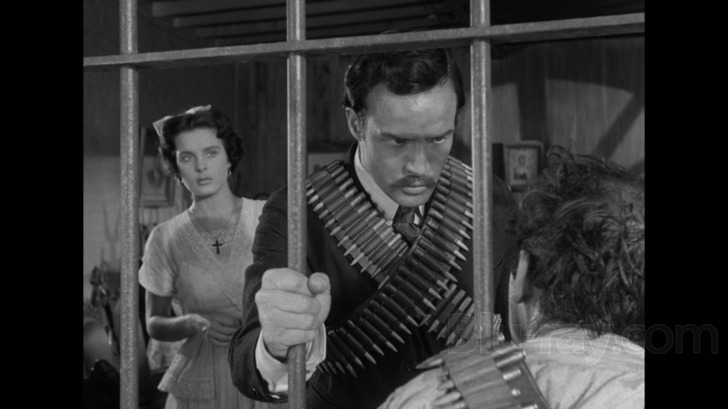
Brando plays Zapata in heavy make-up, with widened nostrils and narrowed eyes, his face gone several shades darker, a la Mitt Romney courting the Latino vote in the 2012 elections. Opening in the early years of the 20th century, Zapata is a 30-year-old peasant from the agrarian village of Anenecuilco. He's come to Mexico City with several local farmers to beg President Porfirio Díaz (Fay Roope) to enact reforms, overturn the near-feudal system of regional government, and return plots of land to the indigenous peoples who've tilled them for centuries. Díaz has been in power for 34 years as a de facto dictator, and he basically dismisses the farmers' appeals outright, telling them to be patient. Zapata gives a zinger of a reply—"With your permission, my president, we make our tortillas out of corn, not patience"—and leads his people home to stake out the boundaries of the land that's rightfully theirs. They're attacked by the forces of the hacienda overlord who's stolen the plot, and Zapata flees to the mountains to avoid capture by the Federales.
Hearing of his exploits, northern reformer Francisco Madero (Harold Gordon) sends the journalist and activist Fernando Aguirre (Joseph Wiseman) to recruit Zapata to their cause, but one part of Zapata would rather settle down, woo the bourgeois Josefa (Jean Peters)—whom he does ultimately marry—and take a job purchasing horses for her father. The other part of him, though—the part that flies into a rage when he witnesses injustices firsthand—urges him to accept Madero's offer and lead the revolution in the south.
The film's middle act chronicles Zapata's rise from humble farmer to firebrand general, cutting telegraph wires, robbing trains, and attracting a following. Steinbeck's script gets the big biographical moments right, but fudges many of the smaller details, like the invented subplot of Zapata being illiterate and learning how to read. On the whole, Steinbeck seems more interested in the historical figure as an idea rather than a flesh-and- blood human being; he structures the film as an allegory for the corrupting influence of power, positing Zapata as the rare sort of freedom fighter who doesn't want to remain in charge after obtaining the change for which he's been campaigning.
This is in contrast to Madero, who unseats Díaz but is just as bad, doing nothing about the villagers' land dispute and becoming a puppet of the violent military General Huerta (Frank Silvera), who's determined to wipe out the remaining revolutionaries. It's also in contrast to Zapata's brother, Eufemio —played by Anthony Quinn, in a raw, Academy Award-winning performance—who fought side-by-side with his sibling for land rights, but then turns around and drunkenly rules the province with an iron fist. Zapata's credo is pure and resolute: "Strong people don't need a strong man." He couldn't care less about wealth and power.
Zapata is perhaps too saintly here, too simplified—even with Brando's wonderfully moody, conflicted portrayal—and Elia Kazan can't seem to decide if he's making a character study or a sweeping, romanticized historical epic. The film is a bit of both, and it occasionally suffers from pacing issues—it could stand to be ten or fifteen minutes shorter—and a lack of dramatic intensity. There's also the problem of authenticity; while many aspects of the production lend themselves to a sense of immersion—the costumes, the high desert settings, Joseph MacDonald's excellent cinematography—others leap out as patently false, like one of Zapata's underlings speaking with what sounds like a New Jersey accent. For as sensitive as Kazan was to issues of social inequality, it's a shame he couldn't have cast more Mexican actors—besides Anthony Quinn—in the main parts.
The Chihuahua-born Quinn would've probably been a better fit for the title role, actually, but apparently he lost out to Brando because of a bet gone bad. Legend has it that the two settled who would play which part with a literal pissing contest, seeing who could arc a stream of urine furthest into the Rio Grande. (Famed photographer Sam Shaw—who created the iconic promo image of Brando in his sweaty t-shirt for A Streetcar Named Desire—is said to have served as the judge.) Who knows how much truth there is to the tale, but the macho posturing and competition between the two definitely does come out on screen and is responsible for some of Viva Zapata!'s best scenes.
Viva Zapata! Blu-ray Movie, Video Quality 
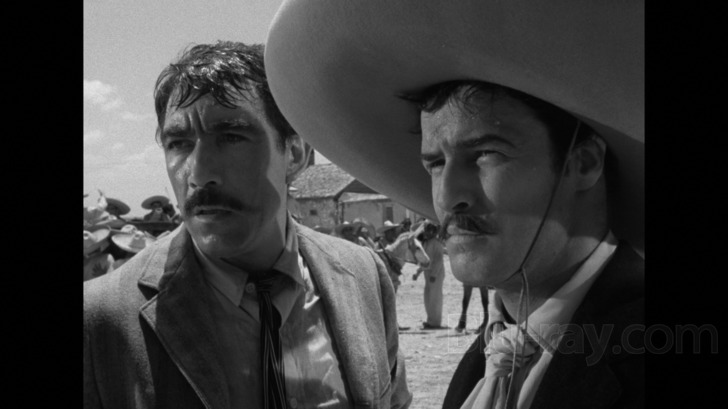
I always look forward to 20th Century Fox's remasters of Elia Kazan films, not only because the films themselves are so good, but because Fox does such a damn good job presenting them in high definition for the first time. Viva Zapata arrives on Blu-ray with a 1080p/AVC-encoded transfer that has obviously been given a careful frame-by-frame restoration. You might spot a few fleeting white specks and a few instances of light brightness fluctuations across the duration of the movie, but that's about it for print damage—no harsh scratches, no hairs, no jittering, no real issues whatsoever. (The lone oddity is that the opening credit sequence is lightly windowboxed for some reason before expanding fully to the intended Academy aspect ratio.) Fox has wisely kept the film's 35mm grain structure and natural integrity intact—no DNR or obvious edge enhancement here—so the picture looks wonderfully organic and rich. There are some noticeably soft scenes here and there, but clarity is usually exceptional, pulling out the fine detail in dirty linen shirts, straw sombreros, and the weathered faces of Zapata and his revolutionaries. The monochrome gradation is handled perfectly too; blacks are deep and consistent—without crushing shadow detail—and whites are bright without ever looking overblown. It's hard to imagine the film looking much better than it does here.
Viva Zapata! Blu-ray Movie, Audio Quality 
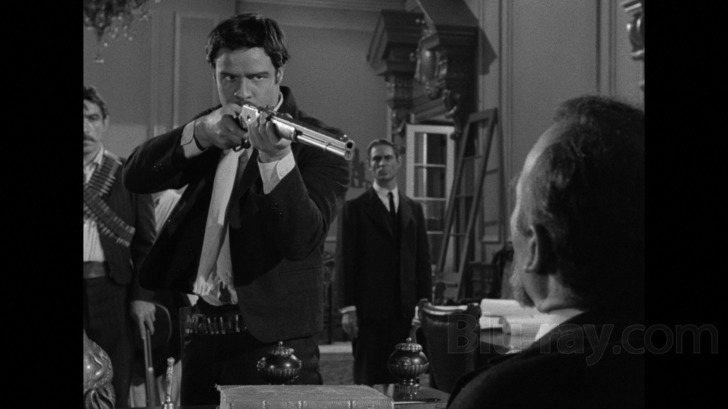
Rather than try to rework the original single-channel audio into a 5.1 mix, 20th Century Fox has given us a lossless DTS-HD Master Audio mono track that's true to source. Like the transfer, there are no significant age-related damage issues here. Crackles, hisses, and pops have been largely attenuated, and though the sound has a somewhat thin dynamic range—like most films from the 1950s—clarity is strong, and the mix can stand being turned up rather loud. Most importantly, dialogue is always clear and easy to understand, even when the deepest register of Brando's voice is at its roundest and most mumbly. A Streetcar Named Desire composer Alex North is responsible for the film's wonderful modernist, Latin-inflected score, and several scenes also include moving diegetic music, including a sad romantic sing-along during the scene of Zapata's wedding night, and a triumphant, horn-heavy march through the streets when the revolution is over. It all sounds excellent within the context of 1950s audio recording capabilities. The disc also includes Spanish and French Dolby Digital mono dubs, along with English SDH and Spanish subtitles, which appear in white lettering.
Viva Zapata! Blu-ray Movie, Special Features and Extras 
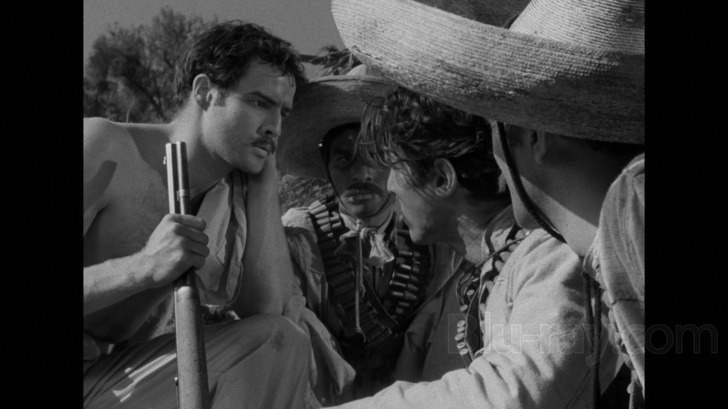
The only extras on the disc, unfortunately, are the film's Theatrical Trailer (HD, 3:18) and Spanish Trailer (HD, 2:48).
Viva Zapata! Blu-ray Movie, Overall Score and Recommendation 
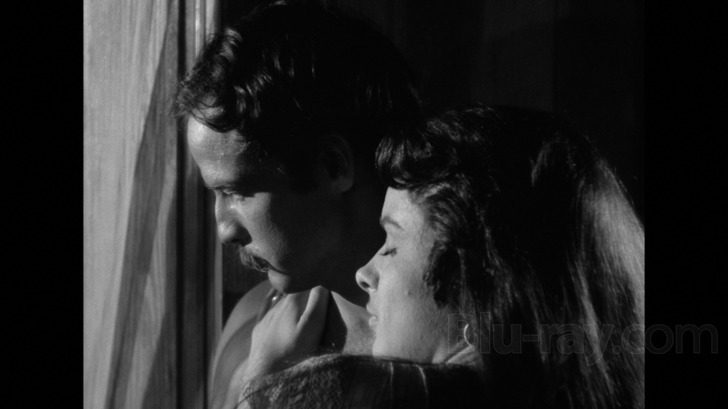
Viva Zapata isn't nearly as well-known or well-regarded as Kazan and Brando's other famous collaborations—A Streetcar Named Desire and On the Waterfront—but if it's not an important film, it is a curious and entertaining one, part romanticized biography, part corruption-of-power fable, and part white-washed political history. For as wrong as it seems now, Brando in brown-face is legitimately excellent as the titular revolutionary, simmering in the conflict between the role that's been thrust upon him and his reluctancy to lead. This would make a great triple feature with the two parts of Steven Soderbergh's Che, which it certainly influenced to some extent. 20th Century Fox's Blu-ray release is short on special features—you'll find only theatrical trailers here—but the striking 1080p transfer is reason enough to upgrade from the long-outdated DVD. Recommended!
Similar titles
Similar titles you might also like

The Last Command
1955

They Came to Cordura
1959

Geronimo: An American Legend
Limited Edition to 3000
1993

Jesse James
Fox Studio Classics
1939

Drums Along the Mohawk
Limited Edition to 3000 - SOLD OUT
1939

The Alamo
2004

Villa Rides
1968

They Died with Their Boots On
Warner Archive Collection
1941

Yellowstone: Season 5
Part Two
2024

The Night Riders
1939

The Kid
2019

Texas Rising
2015

The Alamo
1960

Custer of the West
1967

Lonely Are the Brave
1962

Run for Cover
Colorado
1955

Union Pacific
1939

The Long Riders
4K Restoration
1980

Broken Arrow
1950

The Grey Fox
1982
